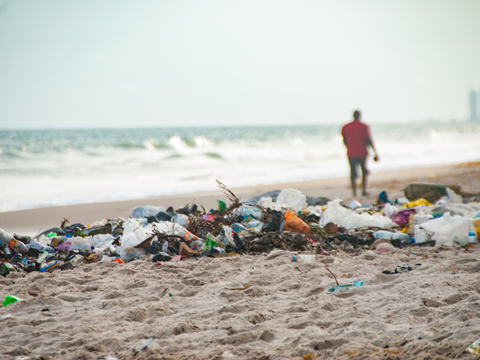
EA Earth Action, SAP, Systemiq, and Delterra have come together to introduce Packaging IQ 2.0 – an update to a data-driven platform designed to help companies measure and cut down on the impact of their plastic waste in line with the upcoming Global Plastics Treaty.
The fourth round of negotiations for a UN Global Plastics Treaty commenced in Ottawa, Canada, commenced yesterday. Corporates and NGOs have encouraged nations to support mandatory disclosure for plastic usage, and although parameters to mitigate plastic pollution at state level are expected, the partners believe that corporate plastic targets ‘mirroring those of governments’ are required to make significant progress.
According to a report from EA Earth Action, plastic waste has risen by almost ten percent since 2021. Over one third of plastic waste is said to be mismanaged at end-of-life, with this year’s exact figure calculated at 69.5 million tonnes.
Further modelling by Systemiq suggests that volumes of mismanaged plastics would almost double – surging from 110 Mt in 2019 to 205 Mt by 2040 – without a comprehensive set of binding global rules.
Meanwhile, non-profit CDP has released data indicating that thousands of companies have not yet implemented ‘key steps’ to reduce plastic pollution across their value chains. 70% of the 3,000 companies that have disclosed their plastics data through CDP’s platform are yet to map the impacts of their plastics on the environment and human health.
Failing to measure and address their contributions to plastic pollution puts companies at risk of supply chain disruptions and regulatory consequences, CDP explains, and many still fall short in spite of ‘ambitious’ voluntary targets.
In response, SAP, EA Earth Action, Systemiq, and Delterra are joining forces in an effort to help companies make informed strategic decisions and report on progress for corporate targets. This includes the introduction of corporate frameworks and data-driven digital platforms for data reporting and plastic waste mitigation.
Supported by The Recycling Partnership and the Walmart Foundation, Packaging IQ 2.0 aspires to provide brands and retailers with the relevant economic, policy, and environmental insights for particular packaging formats and markets – a move hoped to help issues in packaging-related decision-making.
The methodology used to conduct plastic footprint assessments was developed by the Plastic Footprint Network, constituting over 50 global organizations such as WWF and the Ellen MacArthur Foundation. Measuring plastic footprints is set to provide global organizations with a standardized metric to measure the environmental impact of their plastic use – making use of the Plasteax dataset to put it in a global context.
With a Global Plastics Treaty still in the negotiation stage, the proposed increased data exchange is expected to benefit its efforts to enforce plastic disclosure from corporations and unlock ‘more effective’ waste prevention methods. It is anticipated that Packaging IQ 2.0, EA Earth Action, and the Plastic Footprint Network will be able to expand upon existing data and scale globally by working alongside the SAP Responsible Design and Production tool.
Anna Turrell, chief sustainability officer at Decathlon, commented: “As the world’s largest sporting goods retailer we know what is required of us to align with the 2015 Paris Accords for net-zero, but to date, these defined targets and standardized method of accounting for plastic waste has not been defined.
“To this end, our packaging team has pledged to eliminate all single-use plastic packaging by 2026, as part of our own responsibility as an ethical producer. We are excited to unite with these committed organizations and align with the upcoming Corporate Accountability Framework in development in the Plastic Footprint Network, in the hope that will encourage businesses to do the same.”
“CDP is proud to be working with partners of the Plastic Footprint Network to unite behind the call for a robust mandatory disclosure mechanism within the Global Plastics Treaty,” continued Helen Finlay, head of Global Policy at CDP. “Our landmark plastic disclosure findings demonstrate that companies urgently need data to course-correct and tackle plastic pollution.
“The private sector is increasingly recognizing the power of mandatory disclosure within the Treaty to level the playing field in driving this data: last month, 37 global companies with over US$ 270 in market capitalization signed an open letter calling for mandatory disclosure within the Treaty.
“Going into INC-4, we hope policymakers will hear these clear signals from the private sector and ensure mandatory disclosure is cemented within the Global Plastics Treaty.”
Yoni Shiran, partner at Packaging IQ 2.0, added: “Today, brands are facing several obstacles and high costs to transition to more sustainable packaging. We are launching Packaging IQ 2.0 later this year to support brands in making better packaging decisions and allow companies to align across strategies, which we believe is an essential lever for unlocking systems-level change.
“This is a shared vision across Systemiq, Delterra, Earth Action and SAP - only by working together can companies, governments, NGOs and civil society truly address plastic pollution.
“As we head into the INC-4 negotiations, we hope that Packaging IQ 2.0 can help facilitate the direct action required that aligns with a high-ambition global plastic treaty.”
In the run-up to INC-3, the Plastic Footprint Network revealed its unified methodology to measure and reduce plastic footprints globally. The solution is designed to assess plastic leakage for macro- and micro-plastics, evaluate the effectiveness of proposed solutions, and enable outcome-based plastic mitigation.
Soon after, CDP announced that over 3,000 companies had disclosed information about their plastic production, use, and disposal via its environmental disclosure platform. This included Unilever, Johnson & Johnson, and Sumitomo Chemical.
Another 48 financial institutions also signed an open letter calling for corporate disclosure to become mandatory.
If you liked this story, you might also enjoy:
Report: The ultimate guide to global plastic sustainability regulation
The Brief: Oxo-(bio)degradables: the who, what, and why of breaking down fossil-based plastics
Sustainable Packaging Summit: How Kraft-Heinz uses collaboration to drive innovation
The Brief: Using ocean-bound plastic in packaging – how, why and should we?













No comments yet